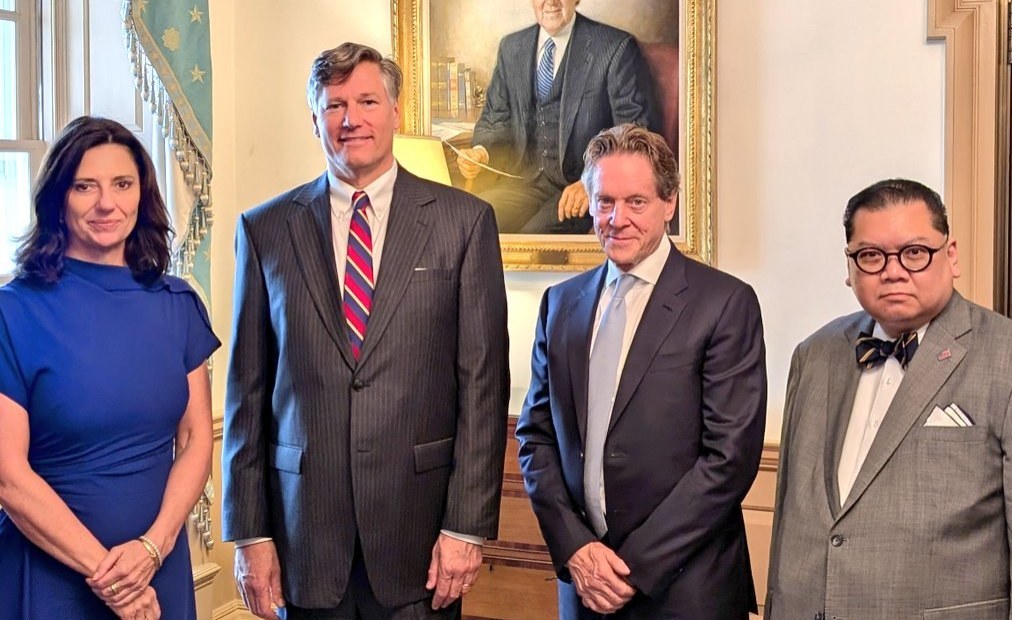Washington, DC — Ivanhoe Atlantic, a U.S.-owned mining company, has announced plans to begin shipping high-grade iron ore from Guinea to the United States via Liberia’s Yekepa-Buchanan rail and port corridor, following the recent signing of a landmark Concession and Access Agreement with the Government of Liberia. The deal marks a major step forward in the company’s cross-border mining and logistics project and was highlighted during a high-level meeting with U.S. Deputy Secretary of State Christopher Landau on Thursday, July 11.
Company executives, including Chairman Robert Friedland, CEO Bronwyn Barnes, and Board Chair J. Peter Pham, met with Deputy Secretary Landau to discuss the significance of the agreement and the strategic opportunity it represents for both U.S.-Africa commercial engagement and the global supply chain for critical minerals.
The meeting took place just one day after President Joseph Boakai’s bilateral session with U.S. President Donald Trump at a private summit in Washington, where Liberia was among five African nations invited to strengthen U.S.-Africa partnerships in trade, investment, and security.
“It was a great meeting! The United States is excited about business opportunities in Africa and other parts of the world that benefit US companies and foreign nations. US private capital can be a great boon to world development and our own security and prosperity,” Deputy Secretary Landau wrote in response to Pham’s tweet, which had praised the U.S. government’s support for the Ivanhoe-Liberia agreement.
Pham, a former U.S. Ambassador and Trump Africa advisor, stated: “Ivanhoe Atlantic Founder @robert_ivanhoe, CEO Bronwyn Barnes & I met @DeputySecState to thank the U.S. Gov’t, esp. @StateDept under @POTUS & @SecRubio, for its support of our agreement with #Liberia🇱🇷 to invest $1.8B in rail to export high-grade #Guinea🇬🇳 #iron ore to the #USA🇺🇲.”
In a separate LinkedIn post, Barnes elaborated: “In Washington today we had the opportunity to brief the US Deputy Secretary of State, Christopher Landau on Ivanhoe Atlantic Inc’s agreement with Liberia to access rail and port to export high grade iron ore from Guinea to the USA. With our founder Robert Friedland, we discussed the broader opportunities for the Liberty Corridor, and expressed our thanks for the deep support of State Department and the President of USA for our development plans for Kon Kweni.”
The agreement, which was concluded last week with Liberia’s Inter-Ministerial Concessions Committee (IMCC), is now awaiting President Boakai’s formal endorsement before being submitted to the National Legislature for ratification.
U.S. support for the agreement has been emphatic. In a statement issued shortly after the agreement was signed, the U.S. Embassy in Monrovia called the US$1.8 billion deal “a crucial step towards President Boakai’s objectives of developing Liberia’s multi-user rail policy and securing new international investment. By increasing U.S. investment in Africa, we drive mutual prosperity and support Liberia’s move from aid to trade.”
Ivanhoe Atlantic’s high-grade iron ore project, known as the Kon Kweni project, is a cross-border initiative in which Guinea holds the ore deposits and Liberia provides the rail and port infrastructure to global markets. The first phase of the project is expected to begin construction in the final quarter of 2025, with environmental and engineering studies scheduled for completion in August.
The rail access agreement–six years in the making–has seen several milestones. Liberia and Guinea signed a Bilateral Implementation Agreement in 2019, under which Liberia committed to provide infrastructure access for iron ore from the Lola region in Guinea. In 2021, Liberia’s Ministry of Transport granted Ivanhoe eligibility status as a transport operator under that agreement. A year later, in 2022, the company signed a framework agreement with the Government of Liberia and made a US$37 million upfront payment for rail access, deposited directly into the government’s revenue account at the Central Bank of Liberia.
Despite this progress, no final agreement was reached during the Weah administration, largely due to internal opposition and lobbying from competing interests, most notably ArcelorMittal Liberia. It wasn’t until the Boakai administration took office and reactivated the stalled negotiations that significant movement occurred.
President Boakai met with Robert Friedland in February 2024 to discuss Ivanhoe’s plans, including the Liberty Corridor–an ambitious future infrastructure initiative modeled on the U.S.-backed Lobito Corridor linking Angola, the DRC, and Zambia. Since May 2024, Ivanhoe and the IMCC have met almost monthly to negotiate and finalize the current agreement.
Estimates suggest that the agreement will generate more than US$1.4 billion in access fees over its 25-year life, with an additional US$600 million in taxes and duties, US$175 million for Social Development Funds in affected counties (Nimba, Bong, and Grand Bassa), and $10 million in capacity support for the National Rail Authority. Upon ratification, Ivanhoe will make a further $25 million payment to the government.
The second phase of the project, which will expand export capacity to 30 million tons per annum, could require up to $900 million in additional infrastructure investment. Notably, the 250-kilometer Yekepa-Buchanan rail corridor sits within a region believed to hold more than 12 billion tons of iron ore, the vast majority of which remains untapped due to lack of infrastructure access under Liberia’s prior single-user rail regime.
With this agreement, Liberia is poised to become a key link in the U.S. critical minerals supply chain, exporting premium-grade ore for low-emissions steel production. The deal also positions Liberia as a regional logistics hub in West Africa and opens the door for future U.S.-Africa infrastructure and energy investments.




